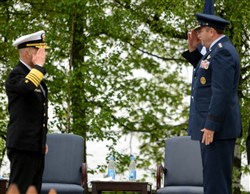HEIDELBERG, Germany — Army health officials in Europe are concerned that misconceptions about the safety and effectiveness of the H1N1 vaccine, coupled with conflicting advice from host nation and American medical personnel may keep some people away from immunization clinics this month.
"We are getting word that some people who face a higher risk of serious medical complications if they catch the H1N1 flu are hesitating to come in for the vaccine," said Army Col. Theresa Moser, director, Force Health Protection, Europe Regional Medical Command. A large number of those who have expressed doubts are expectant mothers being seen by host nation providers.
Not all countries place the same value on vaccinating large portions of the population. The United States Centers for Disease Control, which publishes the medical guidelines military healthcare providers follow, encourages widespread vaccination as the best way to interrupt the natural spread of communicable disease.
"An American being seen by a doctor who has a different cultural philosophy will often receive advice against getting this or any other vaccine," Moser said. "Before any of our beneficiaries make a decision like that, we;d encourage them to visit their U.S. clinic for the other side of the story."
Experts point out that the FDA-approved vaccine being administered in Army health clinics isn't any more or less safe than European Union approved vaccines. But Moser said it was important to get advice about the U.S. vaccine from a U.S. provider who is familiar with the specific vaccine that will be administered. She encouraged anyone with an underlying condition that would put them at medical risk if they contract the H1N1 flu to visit their military health clinic and get the vaccine.
Another safety concern from callers to an AFN Openline radio talk show Nov. 16 centered on the speed with which vaccine manufacturers came out with the H1N1 vaccine. A common misperception is that the H1N1 vaccine is a new, experimental drug.
"The vaccine being administered in U.S. Army healthcare facilities is made using the same processes as those for the seasonal influenza vaccine," Moser said. "That vaccine is prepared each year using the same process as the year before, but targeting different strains of influenza."
The Harvard Medical School Adviser newsletter explained it in a recent article.
"When the new H1N1 virus emerged last spring, most of the seasonal flu vaccine had already been produced. No one predicted the sudden emergence of H1N1. Because there was no time to add H1N1 to the seasonal vaccine, manufacturers made a second flu vaccine for H1N1.
"Manufacturers followed the same procedures to make H1N1 vaccine that they did to make seasonal flu vaccines. Apart from the type of virus in the vaccine, the 'recipe' is the same as for regular flu vaccines. That means it's just as safe as the seasonal flu vaccine already available and carries similar risks. Volunteers who tested the vaccine experienced the same side effects as with other flu vaccines: injection-site pain, fatigue and body aches. No serious side effects have been reported."
"Because H1N1 vaccine is made with the same process as the seasonal flu vaccine, it took six months to manufacture from scratch, officials said. It received FDA approval before distribution began and is just as safe and effective as the seasonal vaccine that has saved millions of lives over the span of decades," Moser said.






